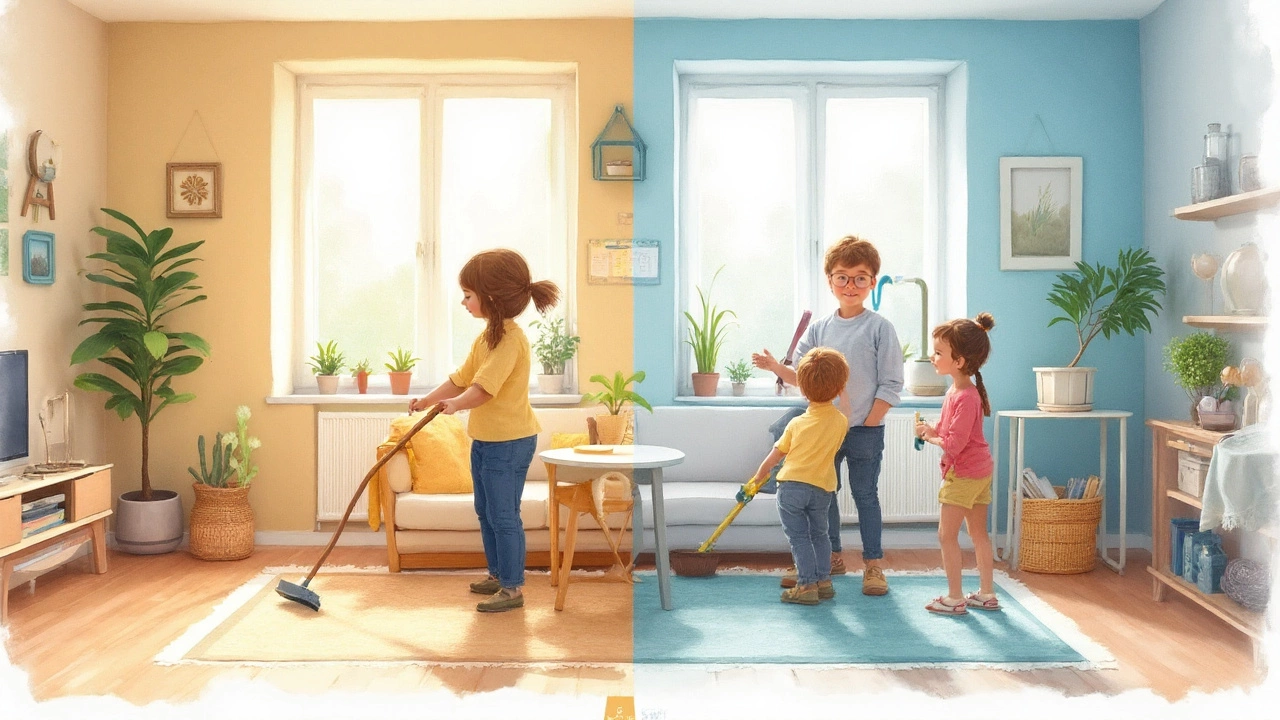Ever finished a deep cleaning session and felt like your home should stay sparkling for months? You’re not alone. Most people imagine that a good, hard scrub means they can ease up on regular chores. The truth’s a bit more annoying: no matter how much elbow grease you put into one epic cleaning, grime never takes the day off. Dust, gunk, pet hair, and fingerprints keep creeping back—sometimes faster than you’d think. So, do you really need to keep up with regular cleaning after a deep clean? The short answer: yes. The longer answer reveals a lot about how dirt works, what deep cleaning can and can’t do, and how a smart routine keeps your home feeling great every day.
The Truth About Deep Cleaning: What It Really Does
Let’s get real about what ‘deep cleaning’ actually means. This is the all-out, marigolds-on, scrubbing-behind-the-fridge, skirting-board-polishing, move-the-sofa kind of clean. The big stuff gets tackled: think washing every window, steam-cleaning carpets, treating grout, or descaling taps. It covers areas and grime that have built up over weeks, months, or (if you’re honest) maybe years. Most cleaning experts agree you should deep clean your home at least twice a year—typically spring and autumn. The NHS suggests deep cleaning tasks like dusting radiators or cleaning behind kitchen appliances help reduce allergens and germs. If you live with pets, have allergies, or your home takes a beating from muddy boots, more frequent sessions might be wise.
But deep cleaning is like hitting the reset button. It wipes the slate clean, but it doesn’t waterproof your bathroom tiles from future mildew, nor does it repel next week’s dust or pet dander. After a deep clean, your home looks and feels amazing, the air’s fresher, and even your mood gets a lift (yes, there’s actual research linking tidier homes and better mental health). But as days pass, crumbs fall, grease splatters, mail piles up, and bathroom mirrors fog with new streaks. The idea that deep cleaning can ‘hold’ a home in pristine shape for ages just isn’t true. Everyday life quickly starts chipping away at those shiny results.
Here’s a fact that surprises a lot of people: the average UK household sheds about 40 pounds of dust every year. This dust isn’t just harmless fluff—it’s a cocktail of dead skin, pollen, pet dander, textile fibres, and minuscule dirt tracked in on shoes. That means even the most spotless home starts collecting grime as soon as you pack away your mop. Let’s throw a few figures into the mix for the curious:
| Area | How Quickly It Gets Dirty Again (on average) |
|---|---|
| Living Room Carpet | Starts collecting dust/pet hair within 24-48 hours |
| Kitchen Worktops | Crumbs and spills reappear daily |
| Bathroom Tiles | Soap scum returns in 3-5 days |
| Windowsills | Visible dust in about a week |
It’s no wonder the glory of a deep clean fades so quickly. Even if you’ve just scrubbed every skirting board and power-washed the patio, the daily drip-feed of dirt keeps coming back.

Why Regular Cleaning Still Matters After Deep Cleaning
So if deep cleaning is the big reset, regular cleaning is the maintenance plan. Think of it as the oil change for your house, not the total engine overhaul. Regular cleaning is about stopping dirt before it builds up and keeping those deep-cleaned vibes alive for as long as possible. It’s much less intense, but it’s also more frequent—like vacuuming every few days, wiping down kitchens and bathrooms weekly, and handling clutter before it morphs into chaos. Homes that only get deep cleaning and neglect the regular bits quickly slide back to messy territory. Have you ever spent an entire day blitzing your flat, only to be annoyed by coffee rings and dusty TV stands within a week? That’s how fast it happens.
A regular cleaning schedule doesn’t just keep your home looking good—it keeps it healthier. Public Health England points out that reducing household dust lowers respiratory issues, especially in homes with children or pets. Bathrooms cleaned weekly have far lower bacteria counts on touch surfaces than those left for a fortnight. And regular kitchen cleaning helps keep down bacteria like E. coli and Salmonella, the culprits behind nasty stomach bugs. If your deep clean involved scrubbing grout white or descaling taps, quick weekly wipe-downs stop limescale and mildew from coming back as fast. It’s simple cause and effect: the more often you clean, the less dirt gets the chance to ‘stick.’
There’s also the ‘good enough’ factor. After a deep clean, each quick tidy feels easier—you’re not up against layers of old grime, just the week’s mess. The job shrinks from a whole Saturday to a half-hour here or there. That’s why most pro cleaners suggest spacing deep cleaning out with regular, bite-sized sessions. Here’s a quick breakdown of what counts for each:
- Deep cleaning (a few times a year): Move furniture, scrub skirting boards, descale appliances, deep-clean carpets, wash curtains/blinds, de-clutter, disinfect hard-to-reach places.
- Regular cleaning (weekly/daily): Dusting surfaces, quick vacuum, wipe kitchen counters, disinfect bathroom, sweep floors, empty bins, tidy clutter.
Even the cleanest home will pick up bacteria. Microbiologists note that bathroom sinks get contaminated in just 48 hours after a major scrub, and kitchen sponges can hold more germs than a toilet seat if not replaced often. Keeping a regular cleaning habit bridges the gap between those deep cleans, so your home actually stays fresh, not just ‘clean’ on special occasions.

Tips to Keep Your Home Fresh Between Deep Cleans
Alright, you’ve deep cleaned. Your house smells amazing, every surface gleams, and you’re feeling smug. But how do you keep it that way for more than a few days? Spoiler: you don’t have to turn into a cleaning robot. The trick is in small, regular moves that fit your lifestyle. Here are practical, real-world tips anyone can use—no matter how much you hate cleaning. Start by picking a couple of spots that tend to get dirty quickest, like the kitchen worktops or the front entryway. Wipe those down as you go—spills, crumbs, and muddy prints are much easier to handle right away than after a week. During telly time, run a quick vacuum or dust of the coffee table. Multitasking makes these chores feel less like a drag.
Divide weekly tasks into chunks: give bathrooms a quick once-over midweek, and vacuum high-traffic zones every few days. Enforce a no-shoes-inside rule; it instantly cuts the amount of grime on your carpets. Give every housemate or family member a job—one person deals with bins, another with dusting. There’s no shame in setting a 10-minute timer: race yourself against the clock and see how much you can blitz. If you’re forgetful, load up your phone with recurring reminders, or stick a simple cleaning rota on the fridge.
Little things add up. Swap out dish sponges regularly. Replace hand towels every few days. If you spot pet hair, a quick go with a lint roller saves you time later. Open windows each day, even in winter, to let fresh air circulate—studies show this really helps flush out airborne dust and bacteria. Don’t forget tech: TV remotes, keyboards, and phones are hotspots for germs, so give them a weekly wipe with a disinfectant cloth. Finally, think seasonally. Spring and autumn are classic deep clean times (with a bit more focus on dust and allergens in spring). In winter, pay extra attention to entryways and boot racks, since mud and grit sneak indoors. Summer’s good for airing out textiles and drying freshly scrubbed curtains outdoors.
Here are a few cleaning cheats from people who know their stuff:
- Keep a small vacuum or handheld duster within reach in living areas
- Line fridge shelves with easy-wipe mats so spillages don’t become sticky sagas
- Store bathroom cleaner and a scrub sponge under the sink—just 2 minutes daily after your shower means less mildew build-up
- Use pillow protectors and wash them with bedding every week—the result: much less dust and lower allergen levels
- Make use of scented sprays or essential oil diffusers—clean smells trick your brain into feeling like things are tidier
It’s all about finding what sticks. Some people slot regular chores into their evening wind-down, others prefer a weekend all-at-once approach. If cleaning feels draining, reward yourself—snack, telly episode, or just the satisfaction of a calm living space. Remember, the key is consistency. A mix of deep cleaning and regular touch-ups wins every time, no matter what marketing spiel or miracle product you might see on TikTok.
So next time after you deep clean your home and wonder if you can skip the weekly routine, just remember: dirt doesn’t care about your busy schedule. But with a smart plan, you really can keep most of the mess at bay—and enjoy that ‘just-cleaned’ feeling for longer than a single Saturday.
